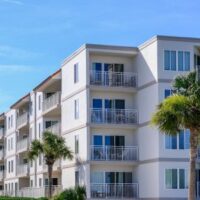HURT AT A CONDOMINIUM IN FLORIDA?

THE CONDOMIMNIUM PREMISES OWNER HAS TWO DUTIES UNDER FLORIDA LAW:
If a person is hurt at a condominium who is at fault? That depends upon certain factors. The first factor is what is the capacity (meaning the legal status) of the person when he or she is at the property. Are they an “invitee” on the premises? Are they a trespasser? There are two general duties owed to an “invitee” on the condominium grounds:
White v. W.G. Parcel B. LLC, 2016 WL 9525667, at *3 (M.D. Fla. Nov. 29, 2016)
A landowner owes two duties to a business invitee:
“(1) to use reasonable care in maintaining its premises in a reasonably safe condition; and
(2) to give the invitee warning of concealed perils that are or should be known to the landowner and that are unknown to the invitee and cannot be discovered through the exercise of due care.”
See TruGreen LandCare, LLC v. LaCapra, 254 So. 3d 628, 631 (Fla. 5th DCA 2018) (same).
What this means is the owner of a condo, or a residence, or a business has two obligations to its customers and potential customers. The first is to maintain the premises in a reasonably safe condition for visitors, and second, to warn those visitors about hazards that may not be obvious.
Where the condominium injury case goes from there can depend upon the nature of the hazard and whether it was “open and obvious”. The standard in Florida is: was the hazard open and obvious to a reasonable person?
Grimes v. Fam. Dollar Stores of Fla., Inc., 194 So. 3d 424, 427 (Fla. 3d DCA 2016) held that
The open and obvious nature of a hazard may discharge a landowner’s duty to warn, but it [still] does not discharge the landowner’s duty to maintain the property in a reasonably safe condition. Dampier, 82 So.3d at 206; Aaron, 908 So.2d at 576–77. To that end, the plaintiff must generally prove that the owner of the premises had actual or constructive notice of the dangerous condition.
HOW TO PROVE THE CONDOMINIUM OWNER KNEW OF THE DANGEROUS CONDITION
How does an injured guest or resident prove the condominium owner or condo association knew of the dangerous condition? As an example, if a condominium association had a broken mis-leveled sidewalk or a broken stair in their common area one could obtain condominium repair records to see if the defect was discussed—but not remediated—in the condominium meeting minutes. One can also obtain information from witnesses as to how long a hazardous condition has existed unrepaired at the condominium. One can also have the condition inspected by an expert witness who can opine as to the length of time the condition has been in existence unrepaired. There are numerous other ways which we the attorneys at www.FightingForFamilies.com have employed to prove that a condominium association or a specific condominium owner knew about a defect or hazardous and failed to repair it. The point here is that the hazardous condition which caused the injury could be in existence for a sufficient length of time that the condominium association had actual knowledge of the dangerous condition, or that the condition had been in existence for such a length of time the condo association should have known about it. Those are the two standards in Florida law which the condominium association is supposed to follow.
DON’T BE INTIMIDATED BY THE CONDOMINIUM ASSOCIATION
At www.FightingForFamilies.com we see clients who have been injured on the grounds of a condominium association where the association has failed to maintain the premises in a safe condition. Many times visitors or residents of a condominium association are reluctant to make a claim against the condo association. It is the legal obligation of the condo association to maintain the premises under Florida law. It is the further obligation of the condo association to warn about hazards which are known to the association. Many condominium premises injury cases we see have occurred because the condo association knew about the defect—or it was a long-standing defect—but which the condo association kept putting off taking care of the dangerous condition. Do not be intimidated by the condominium association even if you are a resident or member of the association; it is their legal duty to make reasonable inspections and to repair conditions which are hazardous and may cause injury to innocent residents or visitors.
SUMMARY
For guests or residents who have been hurt within a condominium association’s premises, condominium owners and condominium associations have a legal obligation under Florida law to keep their premises in a “reasonably safe condition”.
Florida law also requires that condominium owners and condominium associations: Warn of dangerous conditions about which they knew or should have known.
Injured guests or injured residents of condominium association grounds can prove there was “notice” on the part of the at-fault party by condominium association records, by witnesses, by expert witnesses and several other ways.
Both guests of the condominium association as well as condominium owners are entitled to bring a claim for personal injury if they were hurt as a result of a defect on the grounds of the condominium association under Florida law.
Use an experienced attorney, like those at FightingForFamilies.com who have successfully pursued claims against condominium associations for more than 25 years.
